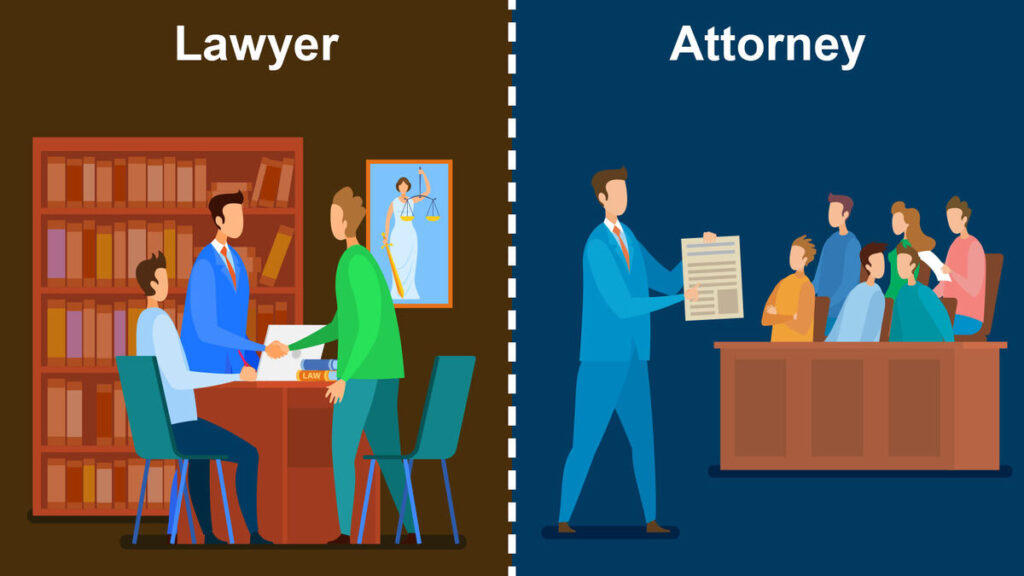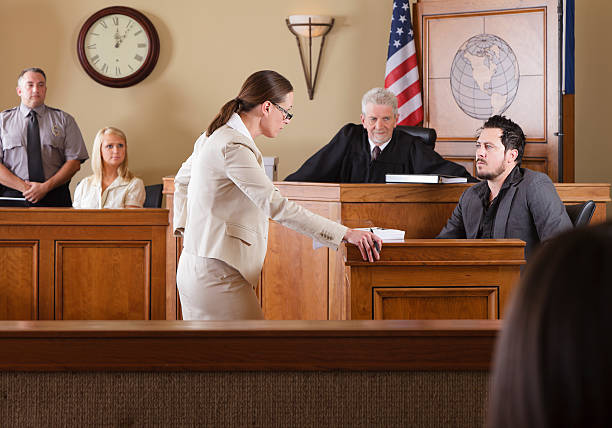The terms “lawyer” and “attorney” have one critical difference: While anyone who graduates from law school is a lawyer, that doesn’t automatically mean the same thing as becoming an attorney under US law. In other words, while all attorneys are lawyers, not all lawyers are attorneys. In general terms, a lawyer is a professional who is qualified to provide legal advice and represent individuals and organizations in legal matters. An attorney, on the other hand, is a lawyer who has been admitted to practice law in a particular jurisdiction.

Understanding the Difference Between Lawyer and Attorney
Both lawyers and attorneys are trained and licensed to practice law. The public often is mistaken when using these terms interchangeably. The term “lawyer” can be used universally to refer to anyone who practices law, while “attorney” should be used more specifically when referring to someone who has been officially admitted to practice law in a particular jurisdiction. This includes personal injury attorney, divorce attorney, district attorney, etc.
Origins of Lawyer and Attorney
Knowing the origins of both terms can also help you understand the difference between attorney vs lawyer. The word ‘lawyer’ has Middle English origins (a period of roughly 300 years from around 1150 CE to around 1450) and refers to someone who is educated and trained in law. Lawyers are people who have gone to law school and often may have taken and passed the bar exam. However, a lawyer doesn’t have to pass the bar exam, as there are plenty of job opportunities for people with a law degree without it.
To practice law, provide legal advice, and offer courtroom aid, you’re required to pass the bar. It’s considered illegal for an unlicensed lawyer to give legal advice, and this can result in criminal charges and legal action against the individual. Without it, law graduates may only provide legal information without interpreting how said information would apply to a particular problem. If a person has not yet passed the law exam, while he or she can provide legal information, he or she cannot interpret the federal and state laws to clients in reference to their legal matters.
Attorney has French origins and stems from a word meaning “one appointed by another to act in his place,” from Old French atorné “(one) appointed,” past participle of aturner “to decree, assign, appoint,” from atorner “to assign,” literally “to turn to”. The term attorney is an abbreviated form of the formal title ‘attorney at law’. An attorney is not only trained and educated in law, but also practices it in court. A simpler definition of an attorney is someone who acts as a practitioner in a court of law.

Roles and Responsibilities of Lawyers vs Attorneys
Like the distinction between the definition of lawyer vs attorney, the difference between the roles and responsibilities of the two professions is important to understand. As noted, both are formally trained and educated in law, but how someone uses their education and training is often a notable difference between attorney and lawyer.
An important designation is that you don’t have to practice law in court to be considered a lawyer. Lawyers may take on roles as consultants or advisors. Many choose to practice in a specialized field such as estate law, immigration law, or tax law, where they can give legal advice to clients.
On the other hand, an attorney is someone who actively practices law in court. Passing the bar exam is a requirement for an attorney, giving them the right to practice law in a specific jurisdiction. Like lawyers, attorneys are required to abide by a code of ethics and may practice in both civil and criminal courts.
As part of a bar association, attorneys must abide by rules of professional conduct and a code of ethics. The word “bar” itself, in the context of legal proceedings, comes from Middle English, as well. It refers to the physical bar dividing a courtroom, at which law practitioners would speak (for the same reason, “barristers” in the United Kingdom are a type of attorney). An attorney-at-law can also be defined as a court practitioner licensed by the state to defend a client or prosecute individuals accused of breaking the law.

How to Get Legal Help from our Attorney
Want to know how our personal injury attorneys in Waterbury & New Britain may be able to help you? Please fill out our online request form at bjmlaw.com to receive a no-obligation evaluation of your case. For us to help you fight for your interests, our Waterbury injury lawyers need to get to know you and your situation. The types of cases our firm handles include but are not limited to:
- Dog bites
- Motor vehicle accidents
- Slip & falls
- Traumatic brain injury
- Whiplash
- Wrongful death
- Medical malpractice
- Premises liability
- Spine injuries
- Truck accidents
- Workers’ compensation
We strive to provide 24/7 service to our clients. Accidents can happen at any moment of the day, so your injury lawyer should always be ready. Our diligent commitment to advocating for the interests of our clients has earned us The Waterbury Observer‘s Best Personal Injury Lawyer award for both 2012 and 2013 and the Best Law Firm award since 2012.
To summarize, the words “lawyer” and “attorney” may be used in different ways depending on the situation. In some situations, the word “lawyer” can mean a general legal professional, while the word “attorney” can mean a specialized legal professional who has been officially admitted to practice law in a certain area. To determine which term is appropriate in your specific situation, give us a call today and we will walk you through each step of your specific situation. Have you or a loved one been in an accident because of another person’s negligent actions? You may be entitled to seek legal recourse. The Waterbury and New Britain personal injury attorneys at BJM Law are known for being a dedicated, hard-hitting legal team. Our court-tested team can help you secure the medical and financial help you need after an injury.


Unravel the nuances between lawyers and attorneys in this insightful exploration of legal terminology.
Delve into the distinctions between lawyers and attorneys and gain a clearer understanding of legal roles.
Discover the subtle yet significant differences between lawyers and attorneys and how they impact legal representation.
This article clarifies the nuances between lawyers and attorneys succinctly.
Understanding the distinction between lawyers and attorneys is crucial, and this piece explains it well.
A concise explanation of the roles and responsibilities of lawyers versus attorneys.
Differentiating between lawyers and attorneys, this article provides clarity for legal terminology.